|
Home > Android Phone Reviews > Moto G 2014 (second gen) XT1064

Moto G 2nd Gen (2014)
What's Hot: Still wildly affordable, unlocked for use with any GSM carrier, good specs for the price, nice styling.
What's Not: No 4G LTE.

Reviewed October 12, 2014 by Lisa Gade, Editor
in Chief (twitter: @lisagade)
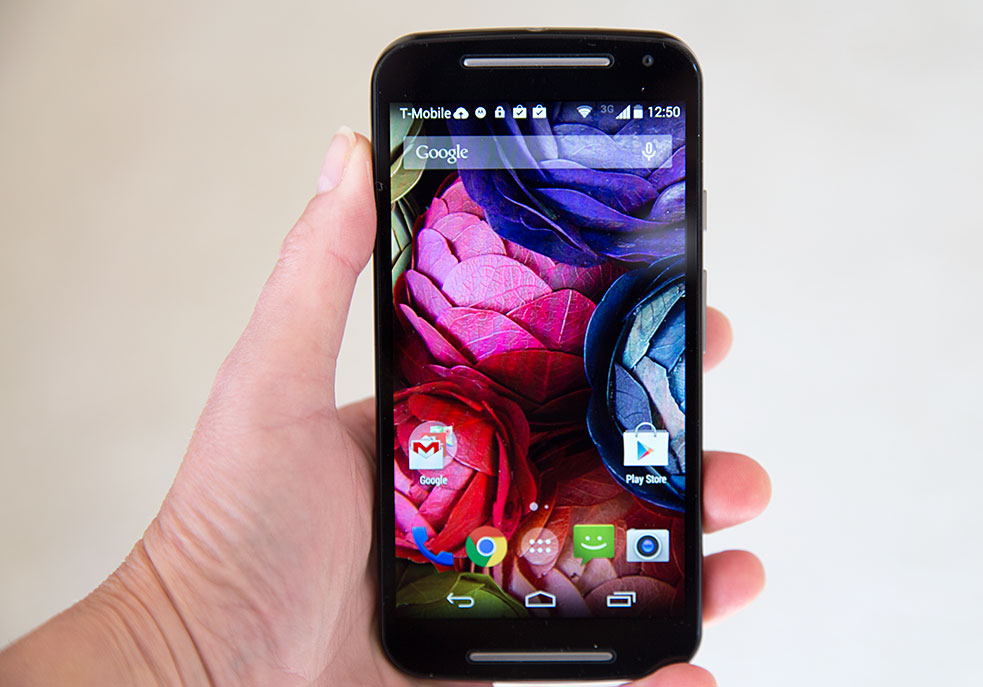
|
|
Note that this model was replaced by the Moto G 3rd Gen in August 2015.
The Moto G is familiar yet new again thanks to the second generation model for 2014. Some things remain the same, like the curvy and attractive design, 1.2GHz quad core CPU and 720p display. But the updated Moto G has a few new tricks including a 5" display that's a half inch bigger than the first gen model, a microSD slot and higher resolution cameras. The impressive low $179 price for the full retail unlocked 3G model stays the same. There's no 4G LTE version, and we hope, as with the last gen Moto G, that Motorola eventually releases an LTE model.
The Moto G looks almost exactly like the first gen model and it bears a strong similarity to other Moto models. It may be inexpensive, but it doesn't look cheap. It's available in black or white, and Moto sells $15 back shells that let you jazz up the colors. There's no MotoMaker customization as with the more expensive Moto X, but that's understandable for the price. Given the phone's larger dimensions compared to the first gen Moto G and Moto X, the phone is a little less comfortable to hold, particularly if you have small hands. But in a sea of 5" and bigger Android phones, it's hardly a behemoth. Motorola said user feedback indicated that folks wanted bigger phones, and thus the second gen Moto phones are bigger.
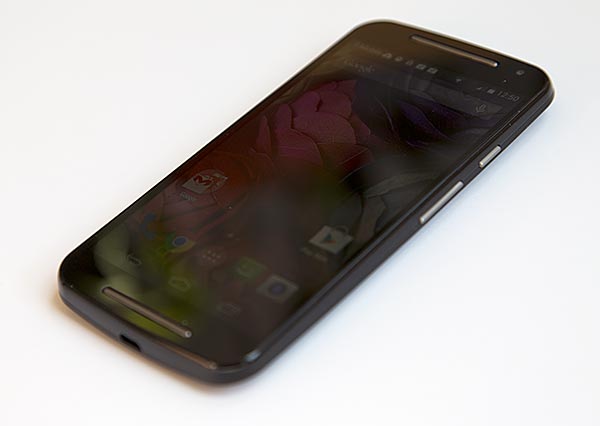
The Moto G's back is matte and has a vaguely soft touch surface that's reasonably grippy and fingerprint resistant. The curves feel perfect in the palm of your hand and the rounded edges mean the phone never gouges in hand or pocket. The gloss front face makes room for stereo speakers behind ornamented grilles. Some folks find that look disruptive, but it's toned down here compared to the second gen Moto X thanks to darker metal and symmetry. Certainly for a phone priced this low, the looks and style are much better than average. Both the volume and power buttons are on the right side and as ever with Moto models, the 3.5mm audio jack is centered up top. The phone has the usual micro USB 2.0 port at the bottom, and the microSD card slot lives under the removable back cover. To remove the cover, you'll work your way around the edges, starting at the USB port. The first few times it's quite stiff, but it becomes easier after that.
Calling and Data
Call quality is good: Motorola knows how to make an excellent voice phone. The Moto G has two mics vs. the Moto X 2014's 4 mics, but we found outgoing voice was still full and clear, even when calling from noisy places. Incoming call quality is also good with slightly louder than average earpiece volume. The phone has Bluetooth 4.0 LE and works with Bluetooth headsets, car kits and speaker systems. This is an unlocked quad band GSM world phone, so you can use it with the GSM micro SIM card of your choice.
Data speeds aren't exciting. The Moto G supports 3G HSPA+ 21Mbps, with no 42Mbps 3G or 4G LTE. That's the price you pay for not paying much for the phone. In countries where LTE 4G is pervasive, we suggest you wait and see if Motorola releases a 4G version of the 2014 Moto G, or consider the last gen model with 4G. Even novice smartphone users notice 4G data speeds and the perceived performance boost that results from faster web page load times, Google Play Store app downloads and the like. We tested the unlocked Moto G second gen with AT&T and T-Mobile micro SIM cards in the US, and download speeds averaged 4Mbps. That's certainly usable for surfing and email, but it's not an ideal choice for Mobile Hotspot tethering. Some carriers like AT&T are repurposing some of their 3G spectrum to 4G LTE, so coverage may suffer a bit as well.
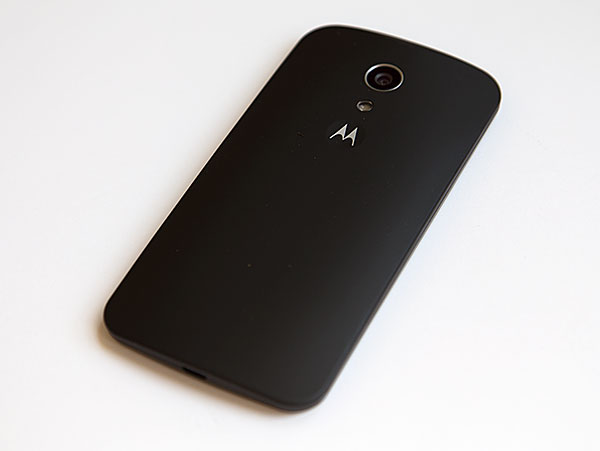
The phone has single band 2.4GHz WiFi 802.11n rather than the dual band WiFi ac of high end models. In practice, it works just fine and unless you're in a very WiFi-congested neighborhood, it gets the job done. Since this is a budget phone, there's no NFC but the phone has the usual GPS and Google Maps.
|
Deals and Shopping:
Advertisement
|
|
Video Review
Display
A 5 inch 720p display isn't going to excite anyone these days unless you're upgrading from a 4 year old smartphone. That said, the 1280 x 720 IPS display is fairly sharp, though we noticed a bit less color saturation compared to the first gen Moto G. Keeping the resolution the same while increasing size by a half inch means a drop in pixel density, but the 2nd gen Moto G keeps it respectable with 294 PPI density (the last gen is 329 PPI). Viewing angles are good but brightness isn't very high. It's useable outdoors but we struggled to see the viewfinder when taking photos outdoors in direct sunlight.
|
Advertisement
|
Performance and OS
There's nothing new here: the 2014 Moto G runs on the same 1.2GHz Qualcomm Snapdragon 400 quad core CPU with Adreno 305 graphics and 1 gig of RAM as the last gen. That's the same stuff you'll find on several entry to mid-tier Android phones and "mini" models from HTC and Samsung. CPUs are so incredibly fast in phones, that the 2x faster flagships are overkill for average users. That said, if you're a serious 3D gamer, this isn't the ideal phone for you. It can play games like Asphalt 8 fine, but the latest Modern Combat titles and Batman Arkham can stutter here and there. Those games are also large, and with the Moto G's modest 8 gigs of internal storage (with 5 gigs available), you'll have a tough time fitting many of today's demanding 1-3 gig titles on this phone. Yes, it has a microSD card slot, and Android KitKat 4.4 supports moving apps to SD cards, but that depends on the app and whether it uses system files (if it does, then you can't move the app).
The phone runs clean AOSP (Android Open Source Project) Android 4.4.4 KitKat, and should be one of the first to get the next gen Android L operating system. Google owns Moto (for now, they're selling it to Lenovo), and Moto G, X and E phones are as close as you can get to a Nexus or developer edition Google model. Moto's few customizations include Motorola Assist that uses your calendar, the time and GPS to change the phone's behavior. If you've a meeting scheduled, the phone can silence itself, and if you're driving it can read text messages aloud (don't be scared when your phone starts yacking in the car!).
Benchmarks
| |
Quadrant |
3DMark Ice Storm Unlimited |
AnTuTu |
Sunspider JavaScript Test (lower is better) |
| Moto G 2nd gen |
8908 |
4680 |
17,970 |
1453 |
| Moto G 3rd Gen |
14,855 |
4399 |
22,861 |
1430 |
| Moto G (1st gen) |
8485 |
2778 (extreme) |
17,396 |
1311 |
| Moto X (2nd gen) |
22,170 |
19,924 |
44,340 |
776 |
| Moto X (first gen) |
8357 |
6800 (extreme) |
21,377 |
1097 |
| LG G3 (3 gigs RAM) |
24,385 |
18,708 |
36,525 |
425 |
| Samsung Galaxy S5 |
23,643 |
18,329 |
35,357 |
398 |
| HTC One M8 |
24,527 |
20,896 |
36,087 |
776 |
| Nexus 5 |
8808 |
17,828 |
27,017 |
718 |
| LG G2 |
19,762 |
9803 |
32,990 |
823 |
| Samsung Galaxy S4 |
12,276 |
11,601 |
24,776 |
826 |
| HTC One M7 |
12,252 |
11,324 (extreme) |
24,589 |
1155 |
Camera
The 8 megapixel rear camera with LED flash is markedly better than the first gen's 5MP shooter. It's not going to trounce the iPhone 6 or other high end camera phones, but for the price and resolution, photos and video are pleasing. There's more detail compared to the last gen thanks to the resolution increase, and overall colors are natural with decent saturation and the camera handles high contrast outdoor scenes passably well. In fact, it's no worse than the second gen Moto X's 13MP camera when it comes to contrast management and white out in bright elements.
The front camera resolution also sees an upgrade to 2MP. That's fine for video chat and the occasional selfie. The camera app has auto HDR, can save to a microSD card and offers full resolution 16:9 and 6MP 4:3 aspect ratios. Like the Moto X 2014 edition, you'll swipe your finger from the left to bring up a wheel of settings and swipe from the right to view gallery photos. The rear camera can shoot 720p standard or slow motion video.
Battery Life
Battery capacity remains the same as the last gen Moto G, but despite the larger display, we didn't see a drop in battery runtimes. Thanks to the 3G radio that uses considerably less power than 4G LTE, the Moto G 2nd gen is an all day phone. The 2070 mAh battery is sealed inside: when you remove the back cover you'll have access to the SIM card and microSD card slot but not the battery that lives under a layer of polycarbonate.
Conclusion
Once again, it's hard to beat Motorola's budget offering. You won't find a name brand phone with a pleasing 720p IPS display, expandable storage, good voice quality and a Snapdragon 400 processor for less. For those looking for a cheap unlocked phone for travel, the Moto G 2014 is a solid alternative to no-name budget phones in terms of features, styling and support. Our only reservation is the lack of 4G LTE. If and when Motorola releases the G with LTE, we'll be even more bullish on this remarkably inexpensive smartphone.
Price: $179
Website: www.motorola.com
Related Reviews:
Moto G 3rd Gen Review (2015)
Moto G (first gen) Review
Moto X (2014) Review
Moto X (first gen) Review
OnePlus One Review
Moto E 2nd Gen Review
Moto 360 Review |
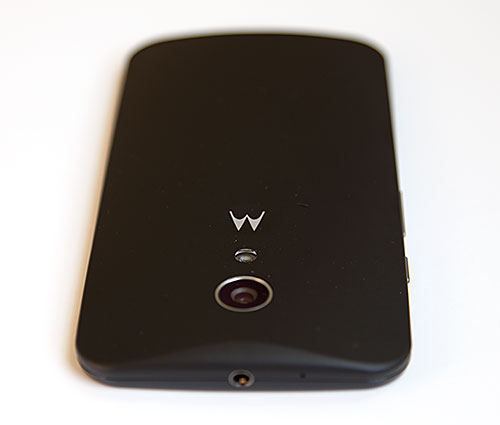
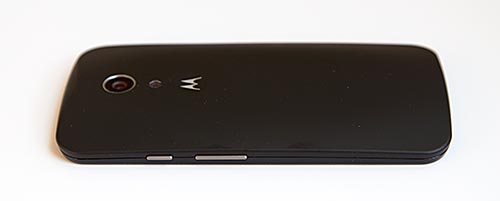
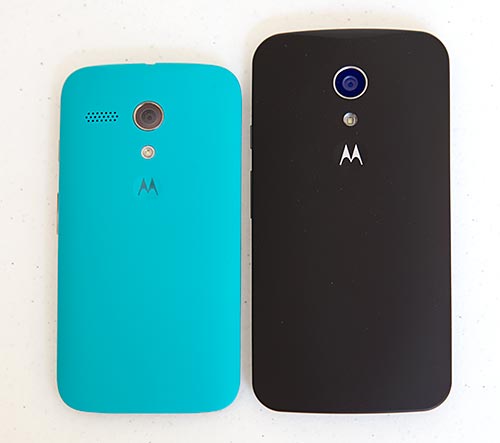
Above: the first gen Moto G and the second gen Moto G. |
Specs:
|
Display: 5" display. Resolution:
1280 x 720.
Battery: 2070 mAh Lithium
Ion Polymer rechargeable. Battery is not user replaceable.
Performance: 1.2GHz quad core Qualcomm Snapdragon 400 CPU with Adreno 305 graphics. 1 gig RAM and 8 gigs of storage.
Size: 5.57
x 2.78 x 0.23-0.43 inches. Weight: 5.26 ounces (149g).
Phone: GSM 850, 900, 1800, 1900 MHz. 3G HSPA 21 Mbps: 850, 1700 (AWS), 1900 MHz.
Camera: 2MP front camera and 8MP rear camera with LED flash, HDR and 720p video recording.
Audio: Built
in stereo speakers, mic and 3.5mm standard stereo headphone
jack.
Networking: Integrated single band
WiFi 802.11b/g/n and Bluetooth 4.0 LE.
Software: Android OS 4.4.4 KitKat.
Expansion: microSD card slot under back cover.
|
|
|

